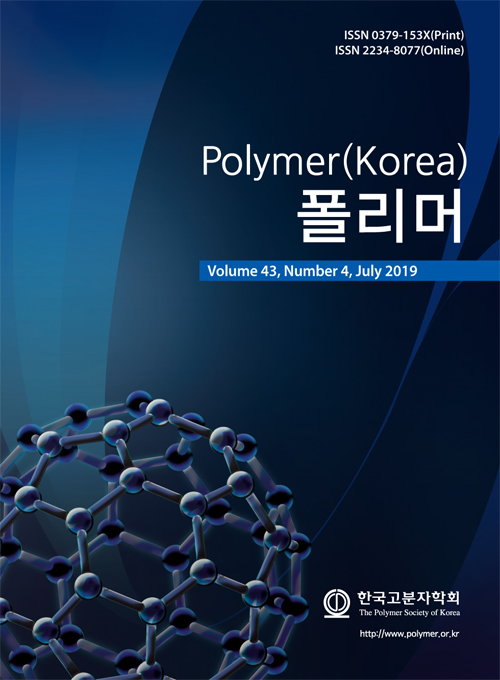- Changes in the Properties of Bio-Based Thermoplastic Polyurethanes with Different Chain Extenders
*School of Energy, Materials and Chemical Engineering, Korea University of Technology and Education, Cheonan, Chungnam 31253, Korea
**Research Center of Eco-friendly & High Performance Chemical Materials, Cheonan, Chungnam 31253, Korea- 사슬연장제의 종류에 따른 바이오 열가소성 폴리우레탄의 물성변화 연구
*한국기술교육대학교 에너지, 신소재, 화학공학부, **친환경고성능화학소재연구소
Bio-based polyester polyol was synthesized by esterification using adipic acid and isosorbide. After the esterification, the bio-based polyurethanes (PUs) were synthesized by the reaction between the polyester polyol, isocyanate (4,4'-diphenylmethane diisocyanate) (MDI) and three chain extenders (1,3-propanediol (1,3-PD), 1,4-butanediol, or isosorbide) with a mixing ratio of 1:2.1:1. A thermoplastic polyurethane (TPU) without extender was used as a control. The structure analysis of bio-based TPUs were performed using FTIR, TGA, and DSC. Viscoelastic properties was investigated using a strain sweep test mode with a rubber process analyzer (RPA). The mechanical properties of samples (tensile strength and hardness value) were characterized with UTM and shore A hardness tester at room temperature. Water- and heat-resistance properties of the bio-TPUs were investigated using an oven and RPA with temperature sweep mode. The bio-based TPU which contained isosorbide as the chain extender showed the best mechanical and viscoelastic properties, and this polymer also showed great water and heat resistance during the test. The bio-based TPUs that contained liner chain extender 1,3-PD also showed excellent viscoelastic properties and heat resistance.
Adipic acid와 isosorbide를 사용하여 바이오 폴리에스터 폴리올을 합성하였다. 합성된 바이오 폴리에스터 폴리올을 4,4'-methylene bis(phenyl isocyanate)(MDI), isosorbide, 1,3-propandiol, 1,4-butanediol 3가지 사슬증량제와 1:2.1:1의 비율로 혼합하여 바이오 폴리우레탄을 합성하였다. 바이오 폴리우레탄의 구조를 분석하기 위해서 FTIR, TGA 및 DSC를 사용하였다. 고분자 가공분석기(RPA)의 변형 스윕(strain sweep) 및 온도 스윕(temperature sweep)기능을 사용하여 바이오 폴리우레탄의 점탄성 및 내열성을 조사하였다. UTM, shore A 기기를 사용하여 바이오 폴리우레탄의 인장강도, 경도를 측정하였다. Oven을 사용하여 바이오 폴리우레탄의 내수성을 조사하였다. 바이오 폴리에스터 폴리올, MDI와 isosorbide에 의한 바이오 폴리우레탄이 가장 좋은 기계적 물성과 점탄성을 보여주었다. 1,3-PD에 의한 바이오 폴리우레탄이 더 좋은 내열성을 보여 주었다.
Keywords: bio-polyurethane, chain extender, viscoelastic, water resistance, heat resistance
- Polymer(Korea) 폴리머
- Frequency : Bimonthly(odd)
ISSN 0379-153X(Print)
ISSN 2234-8077(Online)
Abbr. Polym. Korea - 2023 Impact Factor : 0.4
- Indexed in SCIE
 This Article
This Article
-
2019; 43(4): 621-628
Published online Jul 25, 2019
- 10.7317/pk.2019.43.4.621
- Received on Mar 29, 2019
- Revised on May 9, 2019
- Accepted on Jun 19, 2019
 Correspondence to
Correspondence to
- Ryong Cho
-
*School of Energy, Materials and Chemical Engineering, Korea University of Technology and Education, Cheonan, Chungnam 31253, Korea
**Research Center of Eco-friendly & High Performance Chemical Materials, Cheonan, Chungnam 31253, Korea - E-mail: urcho@koreatech.ac.kr










 Copyright(c) The Polymer Society of Korea. All right reserved.
Copyright(c) The Polymer Society of Korea. All right reserved.